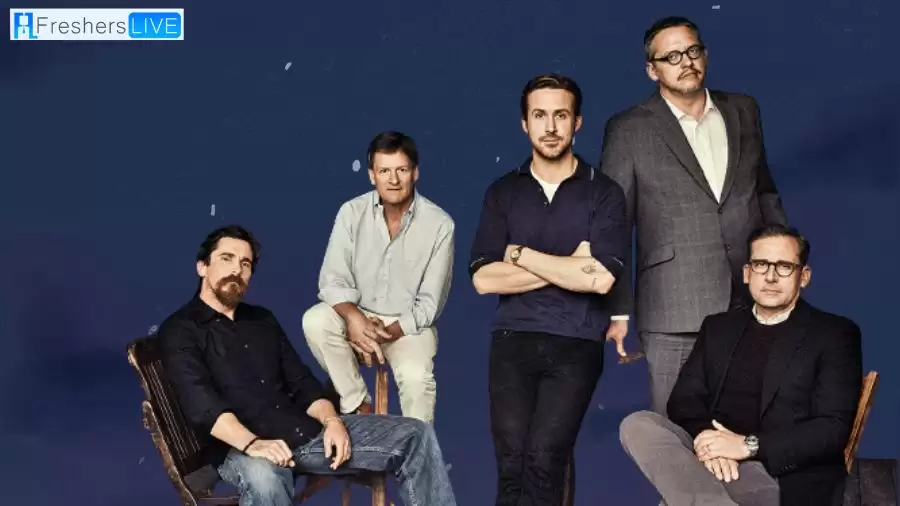The Big Short Ending Explained, Cast, Wiki, and More
by Reshwanth A
Updated Aug 30, 2023

The Big Short Ending Explained
"The Big Short" directed by Adam McKay, delves into the events leading to the 2007-2008 global financial crisis, following financial experts like Christian Bale, Steve Carell, Ryan Gosling, and Brad Pitt's characters. These experts predicted the housing market's imminent collapse and bet against it, ultimately profiting from the crisis. In the film's conclusion, their foresight proves accurate as the housing market crumbles, triggering a far-reaching financial catastrophe.
The final scenes vividly portray the crisis's dire aftermath, marked by job losses, foreclosures, and economic upheaval. The movie serves as a critique of the financial system, spotlighting recklessness, greed, and regulatory failures as contributors to the crisis. Above all, the ending reinforces the film's core message about the financial system's vulnerability and the necessity of accountability and reform following such a momentous disaster.
The Big Short
"The Big Short," a 2015 American biographical crime comedy-drama directed by Adam McKay and co-written with Charles Randolph, is based on Michael Lewis's 2010 book. The film exposes the 2007–2008 financial crisis stemming from the U.S. housing bubble. Featuring Christian Bale, Steve Carell, Ryan Gosling, and Brad Pitt, with cameos by Margot Robbie, Anthony Bourdain, and Selena Gomez, it breaks the fourth wall to explain financial concepts.
Notably, Gosling's character serves as the narrator. Released by Paramount Pictures, the movie grossed $133 million on a $50 million budget, earning acclaim for performances, direction, editing, and screenplay. It won an Academy Award for Best Adapted Screenplay and received nominations including Best Picture and Best Supporting Actor for Bale.
Is Brad Pitt in The Big Short?
Yes, Brad Pitt is a part of the cast in the film "The Big Short." He portrays the character of Ben Rickert, a retired former trader who provides assistance to Jamie and Charlie with their financial trades. This character is based on the real-life trader Ben Hockett. Brad Pitt's involvement adds to the ensemble cast, contributing to the film's exploration of the financial crisis and the individuals involved in predicting and navigating its impact.
The Big Short Oscar
"The Big Short" was a contender at the 88th Academy Awards in 2016. The film received five Oscar nominations:
The Big Short Cast
Christian Bale
Michael Burry
Steve Carell
Mark Baum
Ryan Gosling
Jared Vennett
Brad Pitt
Ben Rickert
Rudy Eisenzopf
Lewis Ranieri
Casey Groves
Fund Manager
Charlie Talbert
Lewis Bond Trader
Harold Gervais
Lewis Bond Trader
Maria Frangos
Exotic Dancer
Hunter Burke
Analyst
Bernard Hocke
Coach
Shauna Rappold
Michael Burry's Mom
Brandon Stacy
Michael Burry's Dad
Aiden Flowers
Young Michael Burry
Peter Epstein
Paul Baum
Anthony Marble
Therapy Businessman
Silas Cooper
Therapy Businessman
Leslie Castay
Therapist
Cast
Role
Where to Watch The Big Short?
"The Big Short" has been available for streaming on several platforms in the past, including popular services like Netflix, Prime Video, and Disney+. However, it's important to note that the availability of movies on streaming platforms can change over time due to licensing agreements and other factors. As of my last update in September 2021, the film might still be accessible on these platforms, but I recommend checking directly on Netflix, Prime Video, Disney+, or using a streaming search tool to confirm its current availability.
The Big Short Ending Explained - FAQs
'The Big Short' is a film that revolves around the 2008 financial crisis and the group of individuals who saw the impending collapse of the housing market. It follows the stories of several financial experts who bet against the market, hoping to profit from its inevitable crash.
The film features an ensemble cast including Michael Burry (played by Christian Bale), Mark Baum (played by Steve Carell), Jared Vennett (played by Ryan Gosling), and Ben Rickert (played by Brad Pitt). These characters are based on real-life individuals who played significant roles in the events leading up to the financial crisis.
'The Big Short' employs various techniques to make complex financial concepts accessible to a broader audience. It uses celebrity cameos to provide simple explanations, breaking the fourth wall to directly address the audience, and employing visual metaphors to illustrate the intricacies of the financial world.
Yes, 'The Big Short' is based on real events and individuals. It is adapted from the non-fiction book of the same name by Michael Lewis, which chronicles the build-up to the 2008 financial crisis and the people who foresaw the market collapse.
The ending of 'The Big Short' emphasizes the aftermath of the financial crisis and its impact on the economy, as well as the lack of accountability for those responsible. It highlights the complex ethical and moral issues surrounding the financial industry and its consequences on society. The film's conclusion also serves as a reminder of the lasting effects of the crisis on individuals and institutions.







